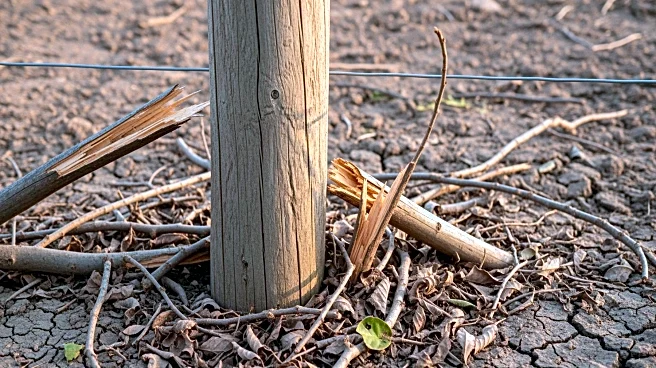What's Happening?
Farmers in the southern Dead Sea region are facing increasing challenges due to wild boars that have been raiding fields and tearing open greenhouses. The boar population, which has grown steadily since the early 1990s, is causing significant damage to crops,
with losses already reaching tens of thousands of shekels. The situation has become more severe over the past year, with boars increasingly entering residential areas and threatening children. Farmers report that the animals are crossing from Jordan, although most originate from a long-standing population near the Sdom Salt Flats. The Israel Nature and Parks Authority (INPA) has been accused of blocking more assertive action, while INPA officials argue that poor sanitation and agricultural waste are attracting the animals.
Why It's Important?
The escalating presence of wild boars in agricultural areas poses a significant threat to local farmers, impacting their livelihoods and causing economic losses. The destruction of crops and greenhouses not only results in immediate financial damage but also has long-term implications for food production and supply in the region. The situation highlights the need for effective wildlife management and conservation strategies to balance agricultural interests with environmental protection. The conflict between farmers and the INPA underscores the challenges of managing wildlife populations in areas where human activity encroaches on natural habitats.
What's Next?
The INPA has issued a culling permit to manage the boar population, but the effectiveness of this measure remains to be seen. Farmers and local authorities may need to explore additional strategies to protect crops and reduce the attraction of boars to settled areas. Improved waste management and sanitation practices could help mitigate the problem. The ongoing dialogue between farmers, regional councils, and environmental authorities will be crucial in finding a sustainable solution to the issue.
Beyond the Headlines
The situation in the Arava communities reflects broader challenges in wildlife management and conservation. As human populations expand and agricultural activities increase, wildlife habitats are often reduced, leading to conflicts between humans and animals. The ethical considerations of culling wildlife populations must be balanced with the need to protect agricultural interests and ensure food security. This case also highlights the importance of community engagement and collaboration in addressing environmental issues.















